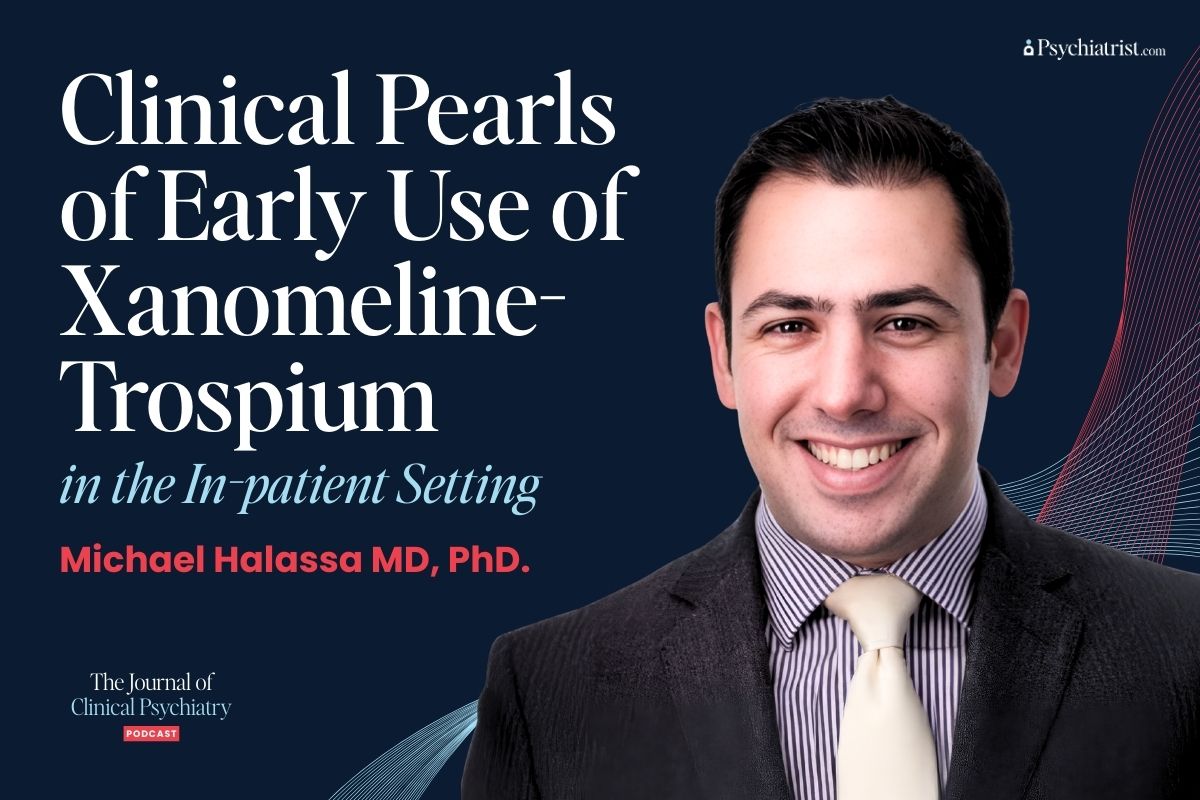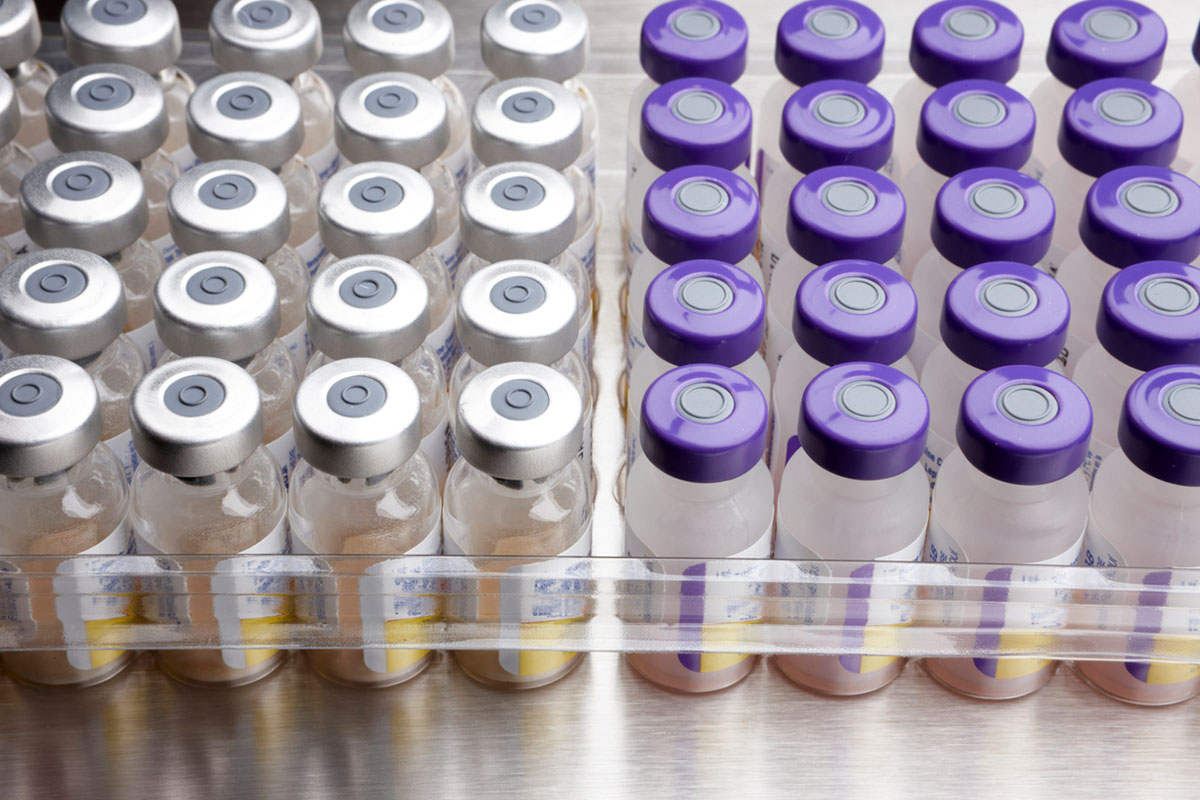Delusions of pregnancy are a rare phenomenon associated with hyperprolactinemia, a neuroendocrine disturbance of the tuberoinfundibular pathway that can lead to pregnancy-like symptoms and psychosis. This condition is more likely to be observed in patients with preexisting psychiatric disorders or with the long-term use of first-generation antipsychotics. Elevated prolactin can mimic pregnancy-like symptoms, including breast tenderness, galactorrhea, and amenorrhea.1 Though fluphenazine has been cited for having an association with hyperprolactinemia, the specific relation between fluphenazine monotherapy and delusions of pregnancy has not been thoroughly explored. This report details the experience of a 32-year-old woman with schizoaffective disorder who developed delusions of pregnancy following the initiation of fluphenazine monotherapy. We aim to provide insight into this neuropsychiatric consequence of hyperprolactinemia induced by fluphenazine treatment.
Case Report
A 32-year-old woman with a history of schizoaffective disorder was admitted to the hospital for an acute episode of psychosis involving disorganized thoughts, internal preoccupation, and a persistent delusion of pregnancy. She has a history of multiple hospitalizations since 2016, and she reported brief mentions of a pregnancy delusion between 2020 and 2023, among other predominant delusions, while on valproate, haloperidol, and loxapine. However, records from a recent outside hospitalization revealed that she did not endorse delusions of pregnancy in January 2024. Then, after initiating monotherapy with fluphenazine 15 mg twice a day for 6 months, she was hospitalized at that facility for a prominent delusion of pregnancy. Her symptoms persisted despite a trial of dual antipsychotic therapy with risperidone 2 mg twice a day and fluphenazine 15 mg twice a day. Of note, the patient was only on risperidone for 5 days before she presented to our facility, and she was reverted to fluphenazine monotherapy 10 mg twice a day.
On admission, her prolactin level was measured at 74.1 ng/mL, a value significantly above normal (<25 ng/mL). Despite multiple negative pregnancy tests during admission, the patient insisted she was pregnant and reported several months of breast tenderness and “milky discharge” from both breasts. However, she endorsed a regular menstrual cycle, though she did not acknowledge how this relates to pregnancy. Given her clinical presentation, the association between hyperprolactinemia and her delusion of pregnancy was strongly considered. The decision was made to cross-titrate fluphenazine with aripiprazole to reduce prolactin levels. By hospital day 8, the strength of her pregnancy delusion began to subside, and she expressed hesitations and doubt. By hospital day 10, her prolactin level had decreased to 27.1 ng/mL. At that time, she was considered psychiatrically stable and discharged on aripiprazole 15 mg daily.
Discussion
Hyperprolactinemia may result from impaired negative feedback of dopamine. Under normal physiological conditions, dopamine is transported through the hypophyseal portal system to the anterior pituitary where it binds to D2 receptors on lactotroph cells. D2 receptor activation then has an inhibitory effect on prolactin gene transcription and thus reduces the synthesis and release of prolactin via negative feedback to maintain homeostasis.2 However, when dopamine receptors are iatrogenically blocked, such as by treatment with typical antipsychotic medications like fluphenazine, the feedback mechanism is impaired, leading to increased prolactin secretion.
Delusions of pregnancy have been reported in patients with hyperprolactinemia caused by various mechanisms, including neoplastic conditions (pituitary adenomas), iatrogenic effects (D2 receptor antagonist medications), and physiological processes (pregnancy). In our patient’s case, the simultaneous resolution of her pregnancy delusion and hyperprolactinemia after aripiprazole cross-titration suggests a link between the two. It is reasonable to conclude that iatrogenic hormonal dysregulation from antipsychotic medication therapy likely contributed to the onset of her psychotic symptoms, as observed in other cases of hyperprolactinemia-induced psychiatric disturbances.3
Elevated prolactin can result in a variety of physical symptoms. Commonly associated with pregnancy, prolactin plays a critical role in stimulating milk production as well as the maintenance of lactation during infant suckling.4 By mechanisms such as inhibiting GnRH, elevated prolactin also suppresses follicle-stimulating hormone and luteinizing hormone levels, effectively inhibiting ovulation.5,6 While hyperprolactinemia has been suggested to have direct neurocognitive consequences such as impaired cognition or proposed neurotoxic effects, associated physical symptoms of oligo/amenorrhea, galactorrhea, and breast tenderness contextualize the established pattern of development of this delusion in our patient.7–9
Several studies have investigated the relationship between hyperprolactinemia and delusions of pregnancy. For instance, a case series by Ali et al10 described patients who developed delusions of pregnancy following hyperprolactinemia induced by risperidone. Similarly, Sharma et al9 examined the manifestations of hyperprolactinemia and its association with delusions of pregnancy, emphasizing the importance of recognizing the endocrine origins of certain psychiatric symptoms. Risperidone, an atypical antipsychotic, is known to have statistically significant elevations in prolactin levels when compared to typical antipsychotics such as haloperidol (P <.001), which notably belongs in the same class as fluphenazine.11 Our case contributes to the literature by identifying fluphenazine monotherapy as a potential risk factor for delusions of pregnancy, likely due to antipsychotic-induced hyperprolactinemia.
This case underscores the importance of considering the neuroendocrine effects of antipsychotic medications when evaluating psychiatric patients. In the present case, our patient was suffering from a delusion of pregnancy for months, which seemed refractory to antipsychotic treatment. However, careful evaluation of the patient’s clinical picture revealed hyperprolactinemia and resultant clinical symptoms such as reports of breast tenderness and galactorrhea. Though she has had chronic schizoaffective disorder, her recent clinical symptoms were previously overlooked and untreated. This underscores how crucial it is to listen to the patient and get a full understanding of the clinical picture, including physical symptoms and laboratory values. Our patient’s delusion improved following a cross-titration from fluphenazine to aripiprazole, an antipsychotic with a lower propensity to elevate prolactin levels. This decision was informed by prior evidence, such as the findings of Hu et al12 and Shah et al,13 which demonstrated the effectiveness of aripiprazole in alleviating symptoms of hyperprolactinemia-related delusions of pregnancy. Our case therefore adds further support to this management technique of transitioning to a prolactin-sparing antipsychotic to reduce hyperprolactinemia-related psychiatric symptoms, including delusions of pregnancy.
Clinicians should be vigilant in monitoring prolactin levels and consider medication-induced hyperprolactinemia in the differential diagnosis of psychiatric symptoms, particularly in cases of delusions of pregnancy that are seemingly refractory to the current antipsychotic regimen. Early detection and intervention in cases of elevated prolactin may help mitigate the development of severe psychiatric manifestations, improving both endocrine and psychiatric health outcomes for patients.
Article Information
Published Online: July 31, 2025. https://doi.org/10.4088/PCC.25cr03954
© 2025 Physicians Postgraduate Press, Inc.
Prim Care Companion CNS Disord 2025;27(4):25cr03954
Submitted: February 27, 2025; accepted April 14, 2025.
To Cite: Ocon VA, Urban C, Othman A, et al. Hyperprolactinemia and delusion of pregnancy in association with fluphenazine monotherapy: a case of a patient with schizoaffective disorder. Prim Care Companion CNS Disord 2025;27(4):25cr03954.
Author Affiliations: Department of Psychiatry, Rutgers New Jersey Medical School, Newark, New Jersey (all authors).
Corresponding Author: Vanessa A. Ocon, MS, Department of Psychiatry, Rutgers New Jersey Medical School, 185 South Orange Ave, Newark, NJ ([email protected]).
Relevant Financial Relationships: None.
Funding/Support: None.
Patient Consent: Consent was received from the patient to publish the case report, and information, including dates, has been de-identified to protect patient anonymity.
ORCID: Vanessa A. Ocon: https://orcid.org/0000-0001-9398-9919; Casey Urban: https://orcid.org/0000-0001-6845-4170; Ahmed Othman: https://orcid.org/0009-0005-4862-7720; Vincent Zhang: https://orcid.org/0009-0002-3931-7374; Najeeb Hussain: https://orcid.org/0009-0009-3456-5994
References (13)

- Bostwick JR, Guthrie SK, Ellingrod VL. Antipsychotic-induced hyperprolactinemia. Pharmacotherapy. 2009;29(1):64–73. PubMed CrossRef
- Gupta S, Makshmanan D, Khastgir U, et al. Management of antipsychotic-induced hyperprolactinemia. Advances. 2018;23(4).
- Vilar L, Vilar CF, Lyra R, et al. Pitfalls in the diagnostic evaluation of hyperprolactinemia. Neuroendocrinology. 2019;109(1):7–19. CrossRef
- Ni Y, Chen Q, Cai J, et al. Three lactation-related hormones: regulation of hypothalamus-pituitary axis and function on lactation. Mol Cell Endocrinol. 2021;520:111084. CrossRef
- Grachev P, Li XF, Goffin V, et al. Hypothalamic prolactin regulation of luteinizing hormone secretion in the female rat. Endocrinology. 2015;156(8):2880–2892. CrossRef
- Hodson DJ, Townsend J, Tortonese DJ. Characterization of the effects of prolactin in gonadotroph target cells. Biol Reprod. 2010;83(6):1046–1055. PubMed CrossRef
- Xu Y, Yao S, Yang Z, et al. The association between prolactin levels and cognitive function in female patients with severe mental disorders. Psychiatry Investig. 2024;21(8):832–837. CrossRef
- Huang W, Molitch ME. Evaluation and management of galactorrhea. Am Fam Physician. 2012;85(11):1073–1080.
- Sharma M, Singh R, Sahu S, et al. Delusion of pregnancy: case series. Indian J Psychiatry. 2024;66(6):576–580. CrossRef
- Ali JA, Desai KD, Ali LJ. Delusions of pregnancy associated with increased prolactin concentrations produced by antipsychotic treatment. Int J Neuropsychopharmacol. 2003;6(2):111–115. PubMed CrossRef
- David S, Taylor C, Kinon B, et al. The effects of olanzapine, risperidone, and haloperidol on plasma prolactin levels in patients with schizophrenia. Clin Ther. 2000;22(9):1085–1096. PubMed CrossRef
- Hu L, Lee YT, Lu T, et al. Using aripiprazole to treat new-onset hyperprolactinemia-related delusion of pregnancy. Aust N Z J Psychiatry. 2015;49(10):946. PubMed CrossRef
- Shah S, Shah P, Salaria SN, et al. Aripiprazole is effective in hyperprolactinemia secondary to use of fluphenazine. South East Asia J Public Health. 2018;7(2):40–42. CrossRef
Enjoy this premium PDF as part of your membership benefits!





